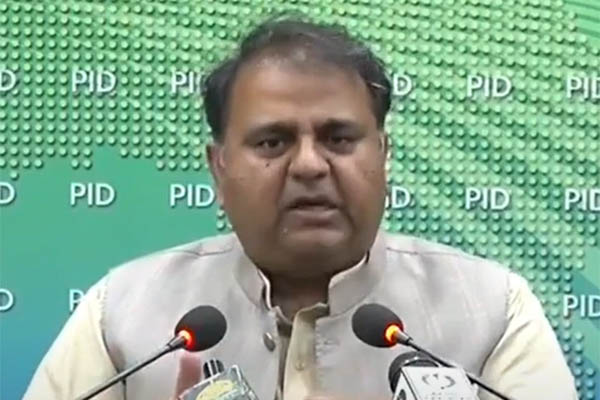
YouTube
Information minister claims opposition is resisting electoral reforms because it cannot win if EVMs are implemented in next polls
Pakistan is hopeful of being removed from the U.K.’s travel red-list, Information Minister Chaudhry Fawad Hussain said on Tuesday, noting that several of Britain’s reservations over Islamabad’s COVID-19 data had been “removed” in recent discussions.
Addressing a post-cabinet press conference in Islamabad, he said that Special Assistant to the P.M. on Health Dr. Faisal Sultan had discussed Pakistan’s coronavirus testing regime with Britain’s chief medical scientist on Monday, adding that it was hoped this would prompt the British government to review its policy. He also hinted at there being a quid-pro-quo aspect to Pakistan’s red-list status, saying that cabinet at deferred a decision on allowing the entry of chartered flights from the U.K. until the U.K.’s next travel advisory had been issued.
The British government retained Pakistan on its travel red-list last month, with a leaked letter written by Britain’s health minister claiming the decision was linked to the U.K. believing the number of coronavirus cases in Pakistan were far higher than reported. The letter also noted that limited genomic surveillance made it difficult to ascertain the COVID variants that might be circulating in Pakistan. Travelers from countries on the red list are required to undergo a 10-day mandatory quarantine at government-designated hotels at own cost—making it difficult for working class travelers to reach the U.K.
EVMs
Despite the Election Commission of Pakistan making it clear that the PTI-led government’s electronic voting machines can be rigged and rejecting their use, Fawad stressed that the cabinet was committed to utilizing them in the 2023 general elections. He said a detailed discussion had been held on electoral reforms, with Adviser to the P.M. on Parliamentary Affairs Babar Awan, Science and Technology Minister Shibli Faraz, and I.T. Minister Syed Aminul Haq briefing the cabinet on their progress.
Alleging that the opposition did not wish to enact reforms because it would have “no future” in politics if the polls could not be rigged, the information minister slammed the opposition for not engaging with the government on the use of EVMs. “They [opposition] reject all electoral reforms saying ‘we don’t accept it’,” he claimed.
He also claimed—wrongly—that no government in the past had attempted to improve the electoral system. In 2014, then-prime minister Nawaz Sharif had asked the National Assembly speaker to establish a parliamentary committee to enact electoral reforms—at the time the PTI had skipped the majority of its meetings.
Reviving cinema
The information minister said a proposal had been presented to the cabinet for non-Indian Punjabi films to be screened in Pakistan to revive the country’s cinema industry. He said that the cabinet had decided to allow the import of all foreign movies, barring those produced in India, adding that his ministry would present an amended proposal soon.
“In the proposal, we will seek permission to allow foreign movies in Pakistan. In the 70s we had 780 cinemas, which have been cut down to 78. If we don’t take immediate steps for the film and cinema industry’s revival, it will collapse,” he said, and said a package for the film and cinema industry would be announced next week.
Remdesivir’s price lowered
The information minister the cabinet had decided to reduce the price of Remdesivir—a drug used to treat critical COVID-19 patients—from Rs. 5,680 to Rs. 3,967. He said the cabinet had also approved a plan to send home 200 employees of the Pakistan Medical and Dental Council through golden handshake and had approved funds for this purpose.
The cabinet also approved the formation of a Joint Security Commission of Pakistan and Uzbekistan for border security and curbing terrorism. A National Data Depository in the National Database and Registration Authority has also been approved to centralize important citizen data.
Regarding the allotment of plots to bureaucrats, judges, and journalists, Fawad referred to the Federal Government Employees Housing Authority audit report for 2018-19, saying it was unfortunate that the poor were exploited in Islamabad for the benefit of the elite. Prime Minister Imran Khan, he said, had constituted a committee headed by Planning Minister Asad Umar to formulate a comprehensive policy on this and bar the acquisition of land from the impoverished for housing societies.
The minister claimed that the incumbent government had transformed several state-owned enterprises, barring the National Highway Authority, into profitable entities. He said that the SOEs had incurred losses of Rs. 286 billion in fiscal year 2017-18, but now showed profits of Rs. 31 billion “except the NHA, which faced losses of Rs. 140 billion.”
